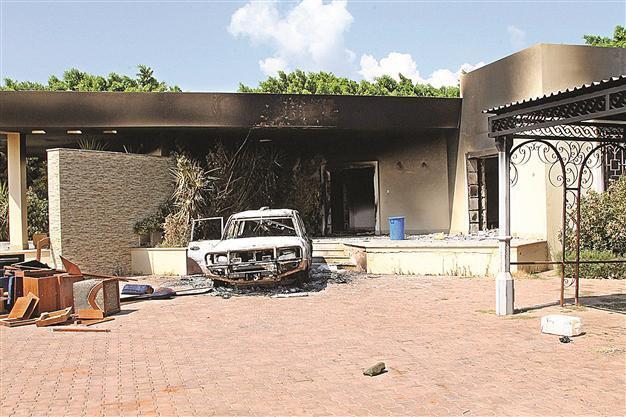Inquiry slams US over Benghazi
WASHINGTON - Agence France-Presse

This file photo taken on Sept 12, 2012 shows a burnt house and a car inside the US embassy compound in Benghazi after an attack. A long-awaited inquiry slams State Department security arrangements there as ‘grossly inadequate.’ AFP photo
An independent panel tasked with investigating the deadly Sept. 11 attack in Libya that killed the U.S. ambassador and three other Americans has concluded that systematic management and leadership failures at the State Department led to “grossly” inadequate security at the Benghazi mission.
“Systematic failures and leadership and management deficiencies at senior levels within two bureaus of the State Department resulted in a special mission security posture that was inadequate for Benghazi and grossly inadequate to deal with the attack that took place,” the panel said.
The report singled out the Bureau of Diplomatic Security and the Bureau of Near East Affairs for criticism, saying there appeared to be a lack of cooperation and confusion over protection at the mission in Benghazi, a city in eastern Libya that was relatively lawless after the revolution that toppled Libyan leader Moammar Gadhafi.
Despite those failures, The Accountability Review Board (ARB) determined that no individual officials ignored or violated their duties and recommended no disciplinary action for the moment. It also, however, said poor performance by senior managers should be grounds for disciplinary recommendations in the future.
The report appeared to break little new ground about the timeline of the Benghazi attack during which Ambassador to Libya Chris Stevens, information specialist Sean Smith and former Navy SEALs Glen Doherty and Tyrone Woods, who were contractors working for the CIA, were killed.
But it confirmed that contrary to initial accounts, there was no protest outside the consulate and said responsibility for the incident rested entirely with the militants who attacked the mission.
In the immediate aftermath of the attack, administration officials linked the attack to the spreading protests over an anti-Islamic film made in the U.S. that had begun in Cairo earlier that day. Those comments came after evidence already pointed to a distinct militant attack. U.N. Ambassador Susan Rice appeared on numerous TV talk shows after the attack and used the administration talking points linking it to the film.
The panel found that budget constraints in the past had led some management officials to emphasize savings over security, including rejecting numerous requests from the Benghazi mission and the embassy in Tripoli for enhanced protection. The five-strong board added they believed every effort had been made to rescue the U.S. ambassador.
The review board determined that there had been no immediate, specific tactical warning of a potential attack on the 11th anniversary of Sept. 11, 2001, attacks. However, the report said there had been several worrisome incidents in the run-up to the attack that should have set off warning bells.
Clinton accepts all recommendationsThe report provided “a clear-eyed look at the serious, systemic challenges that we have already begun to fix,” U.S. Secretary of State Hillary Clinton said in a letter to lawmakers, adding that while everyone at the department had a duty to ensure diplomats’ safety, “most of all it is my responsibility as secretary of state.”
Clinton set up a team to implement the findings of the inquiry and has entrusted Deputy Secretary Tom Nides with heading up the implementation team, which met for the first time Dec. 18.
Clinton said she accepted “every one” of the 29 recommendations made by the ARB, which has spent the last three months investigating the events of the night. She also said the State Department was working with the Pentagon to “dispatch hundreds of additional Marine Security Guards to bolster our posts.”
The New York Times reported the State Department is asking Congress to transfer $1.3 billion from contingency funds that had been allocated to Iraq. This would include $553 million for the extra Marines, $130 million for diplomatic security personnel and $691 million for improving security at diplomatic missions, the daily said.
